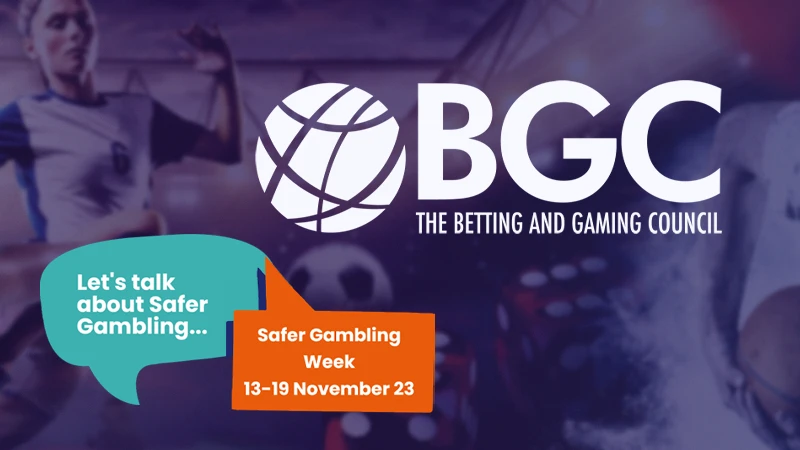Betting and Gaming Council Chair says Safer Gambling Week critics "defy logic"

The Betting and Gaming Council (BGC) has come under fire in recent weeks, attracting the ire of several campaign groups who have criticised its recent Safer Gambling Week initiative.
The annual scheme, now in its seventh year, ran in mid-November 2023, in an attempt to raise awareness of safer gambling practices. Backed by the gambling industry and other stakeholders, the campaign has a two-fold aim: 1) to give players information and resources needed to prevent problem gambling from taking hold, and, 2) to encourage safer gambling practices.
Hailed a success by the BGC, the campaign saw over 50 million social media impressions, with 500,000 website visits over 7 days, far surpassing last year.
But not everyone agrees with the campaign, its goals and its efficacy – most notably the anti-gambling lobby. Gambling With Lives called Safer Gambling Week “a cringe campaign”, while Christian Action and Education said the campaign was a “cynical stunt”.
Now the chair of the BGC has hit back, criticising the motives and attitude of opposition groups, while highlighting the positive impact Safer Gambling Week has had in raising the profile of safer gambling behaviours.
Defying logic and common sense
Writing for PoliticsHome.com, BGC chair Bridget Simmons was robust in her defence of the achievements of the campaign, while also addressing the dissenting voices and their approach to raising industry standards.
Lashing out at the critics, Simmons said “so-called campaigners” were “tripping over themselves to attack and undermine” the work of Safer Gambling Week – something she argues defies both logic and common sense.
While acknowledging it was early days for seeing direct results from this year’s campaign, Simmons said with the popularity of gambling, and the albeit small but significant issue of problem gambling, Safer Gambling Week would continue to work towards raising awareness of safer gambling.
“Safer Gambling Week is essential because betting and gaming is an incredibly popular pastime for people from all walks of life and we want to keep customers safe. Each month around 22.5 million people enjoy a bet in the UK and the overwhelming majority do so safely and responsibly. According to the most recent NHS Health Survey – considered the gold standard for such research – problem gambling rates were 0.4 per cent of adults in England.”
“However, one problem gambler is one too many. So, while we are determined to raise standards and promote responsible betting and gaming all year round, Safer Gambling Week gives us, and the 110,000 people who work in this industry, the opportunity to focus minds and deliver this with a really big impact. We will carry on this work, not just for one week, but every week of the years ahead.”
Promoting safer gambling
The objections raised by anti-gambling campaigners seem knee-jerk. While the BGC makes no attempts to disguise its role as the interest group for the regulated gambling industry, criticising proactive measures being taken by the BGC, gambling operators and other stakeholders to promote and publicise responsible gambling is unhelpful.
Wider objections to a legalised gambling sector are a matter of opinion, and the campaign groups attacking Safer Gambling Week are clear on where they stand. But this does not detract from the real world. Legalised gambling is a fact of life in the UK, and with that comes the issue of problem gambling. The reality is if gambling wasn't legal, there would be a significant illegal gambling sector with all the attached problems that come with operating outside the law.
As Simmons said, one problem gambler is one too many, and the industry has a moral and social responsibility to do everything it can to address these problems, and to provide tools and support to those suffering as a result of their gambling. The gambling industry already voluntarily contributes heavily to safer gambling initiatives, and will likely do so to an even greater extent on a mandatory basis once the government’s white paper policies make it onto the statute books.
Campaigns like Safer Gambling Week are clearly going a long way towards publicising the issue, which is the first step in reducing the numbers of people who fall into difficulties with their gambling.
During 2022’s Safer Gambling Week, 200,000 accounts set deposit limits, with some 61% of those set by players who had never previously set limits on their accounts. The reach of this year’s campaign is 70% up on 2022, which in itself broke previous records. It’s hard to deny that this is a good thing in the context of addressing problem gambling, and raising the profile of the tools already out there to help players help themselves.
While impossible to please everyone, it’s hard to see how the Safer Gambling Week campaign can be called anything other than a success when benchmarked against its own objectives. And it's hard to really understand the motives of individuals and organisations who would so readily criticise an initiative that hard data and stats tells us is having a positive impact.
